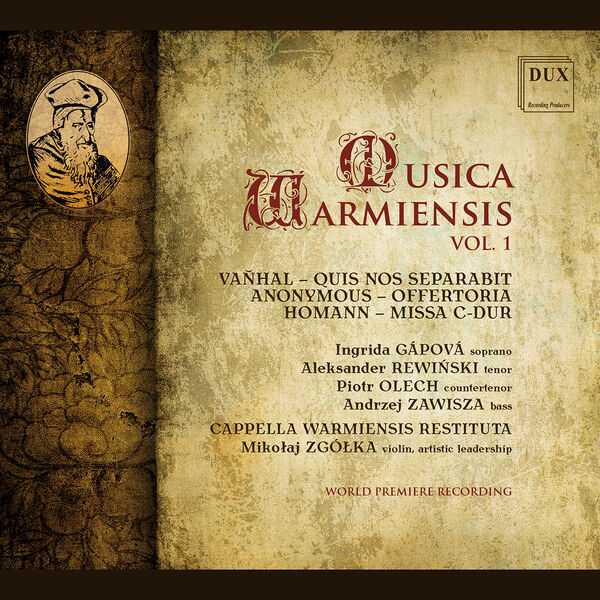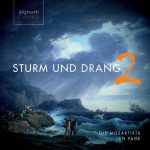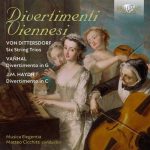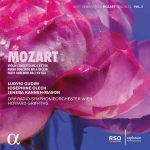

Performer: Cappella Warmiensis Restituta, Ingrida Gapova, Piotr Olech, Aleksander Rewinski, Andrzej Zawisza
Conductor: Mikołaj Zgółka
Format: FLAC (tracks)
Label: Dux
Catalogue: DUX1800
Release: 2022
Size: 1.08 GB
Recovery: +3%
Scan: yes
01. Vaňhal: Terzetto Quis nos separabit
anon.: 3 Offertorios
02. No. 1, Surgite nunc pauperes – Quam bona Mater es – Surgite nunc pauperes
03. No. 2, Dei gloriam – O Deus – Dei gloriam
04. No. 3, Templum Domini – Domus mea – Templum Domini
Homann: Mass in C Major for Choir & Orchestra (Not after 1773)
05. I. Kyrie
06. II. Christe
07. II. Kyrie
08. III. Gloria
09. IV. Qui tollis
10. V. Quoniam – Cum sancto
11. VI. Amen
12. VII. Credo
13. VIII. Et incarnatus
14. IX. Et resurrexit
15. X. Et vitam venturi
16. XI. Sanctus
17. XII. Benedictus
18. XIII. O sanna
19. XIV. Agnus Dei
This album is a recording premiere of music from Warmia, related to the local centres associated with the Catholic Church, including the cathedral school in Frombork and the collegiate school in Dobre Miasto.
The musical source material that became the basis of this recording has been recently found in the collections of the Library of the Higher Theological Seminary of the Warmia Metropolis ‘Hosianum’ in Olsztyn by its director, Fr Tomasz Garwoli 324;ski, who then became the originator of the recording project.
The repertoire performed on the album consists of compositions left behind by Warmia bands active at church centres. The oldest of the rich collection of more than 800 preserved works can date back even to the 16th century. These are mainly sacred vocal and instrumental compositions, including arias, vespers, litanies, offertories, graduals and masses, but also secular compositions. They were written by well-known composers at that time as well as by the ones whose fame did not go beyond the Warmia centres.
For the purpose of the recording, the composition of Jan Kritel Vanhal (17391813) Quis nos seperabit, three anonymous fragments of the Offertorium and Missa in C Major for choir and orchestra by P. Homann were selected. March from the oratorio Quo vadis was one of the most frequently performed works.



